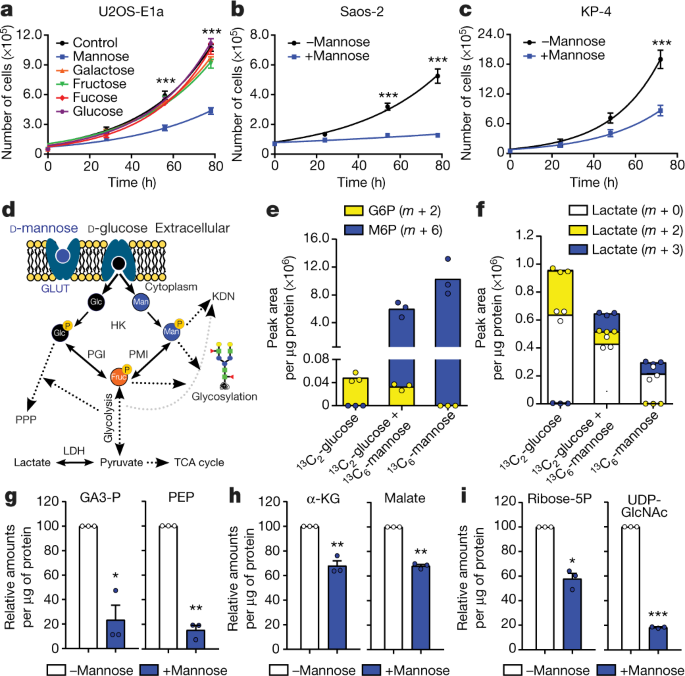It is now well established that tumours undergo changes in cellular metabolism1. As this can reveal tumour cell vulnerabilities and because many tumours exhibit enhanced glucose uptake2, we have been interested in how tumour cells respond to different forms of sugar. Here we report that the monosaccharide mannose causes growth retardation in several tumour types in vitro, and enhances cell death in response to major forms of chemotherapy. We then show that these effects also occur in vivo in mice following the oral administration of mannose, without significantly affecting the weight and health of the animals. Mechanistically, mannose is taken up by the same transporter(s) as glucose3 but accumulates as mannose-6-phosphate in cells, and this impairs the further metabolism of glucose in glycolysis, the tricarboxylic acid cycle, the pentose phosphate pathway and glycan synthesis. As a result, the administration of mannose in combination with conventional chemotherapy affects levels of anti-apoptotic proteins of the Bcl-2 family, leading to sensitization to cell death. Finally we show that susceptibility to mannose is dependent on the levels of phosphomannose isomerase (PMI). Cells with low levels of PMI are sensitive to mannose, whereas cells with high levels are resistant, but can be made sensitive by RNA-interference-mediated depletion of the enzyme. In addition, we use tissue microarrays to show that PMI levels also vary greatly between different patients and different tumour types, indicating that PMI levels could be used as a biomarker to direct the successful administration of mannose. We consider that the administration of mannose could be a simple, safe and selective therapy in the treatment of cancer, and could be applicable to multiple tumour types. Mannose reduces the growth of tumour cells by impairing the metabolism of glucose, and enhances cell death when used in combination with conventional chemotherapy.
Latest
-
Wegman uses biometric surveillance on shoppers, raising privacy concerns
-
UK ordered agents to find UFO tech in bombshell 1990s secret files shocker | New York Post
-
Private equity barons target savers in hunt for ‘the perfect bailout’
-
Giant structure discovered deep beneath Bermuda is unlike anything else on Earth | Live Science

